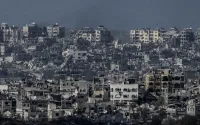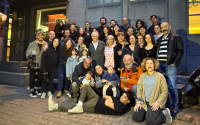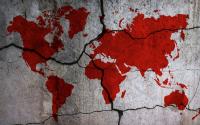by Azmi BisharaAl AhramApril 27, 2002
At the very moment the Arab masses were being transformed into a collective movement, taking to the streets in order to exercise just one aspect of their rights as citizens, demanding that their leaders should act as leaders and take resolute decisions against US and Israeli policies -- at precisely this moment, leaders (who, by and large, rule above the law and often in accordance with idiosyncratic whims) became concerned citizens. Faced with the unprecedented momentum and expansion of the grassroots protest movement in solidarity with the Palestinian cause, Arab leaders have revamped the notion of citizenship as a synonym for weakness. When an Arab leader says, "I'm a concerned citizen just like you," what he means is: "Don't expect anything from me, because I'm just as weak as you are." The leader, who is all-powerful the rest of the year, and whose overwhelming powers democracy and human rights groups have been trying to restrict through legal checks, declares to his public that he is powerless. But the leader's momentary democratic transformation is not without limitations. His political mind can conceive of citizenship only as a synonym for impotence. There are no "citizens" in the Arab world throughout the rest of the year. But, when hundreds of thousands of individuals move to exercise one aspect of citizenship only -- the right to influence the political decision-making process -- even when the whole edifice of civil and individual rights is absent, their leaders become jealous and rush to appropriate the term "citizen," having rendered it equivalent to "powerless," as in: "We are all concerned citizens, but what can we do?" Palestine, as is its custom, has again acted as the trigger, igniting an explosion of frustration at the absence of justice, social guarantees and human rights. Palestine has become the synonym for Arab sufferings, the language into which is translated the desperation of the poor, the pleas of the weak and the anguish of the intellectual. The scale, scope and persistence of the current round of protests are of great significance. Even those who were around to experience the wave of Arab protest in solidarity with Egypt and Gamal Abdel-Nasser following the tripartite invasion of 1956 attest that an important difference exists between the two movements. In 1956 the protest movement was associated with a political project with pan-Arab horizons. In Abdel-Nasser's nationalisation of the Suez Canal, which provoked the wrath of the British and the French, the Arab masses saw a model for how an Arab nation should act. The popular outpouring following the tripartite invasion was not so much an act of commiseration as it was an expression of a political will. The current popular movement against Israel's aggression is a far more significant political phenomenon: it affirms that the Arab street pulses with political life. What happened? It is simple -- people took to the streets. In the absence of democratic leaderships capable of posing an alternative to the status quo at the national level, regimes responded to this movement in various ways. At times they unleashed the riot police to fire tear gas canisters to disperse the demonstrators, at others they unleashed tear-provoking speeches of the "I'm just a citizen like you" variety in order to contain the grassroots movement. For unlike a democratic programme, the Palestinian cause can work both to divide peoples and their governments and to join them together. An Arab regime that affirms the need to implement international resolutions and the Tenet and Mitchell plans accepted by the Palestinian leadership can also absorb popular anger and demonstrate along with the people against Sharon and his brutality. The Palestinian cause is the symbol, spirit and legitimate channel of expression for Arab political sentiments. It cannot, however, serve as an alternative to a political programme: we will remain incapable of handling an issue as complex as the Palestinian cause in a manner that transcends the futile writing of curses and hexes on signs and banners without an enlightened democratic political awareness of the nature of the confrontation between the Palestinian national movement and Arab nationalism, on the one hand, and Zionism as an ideology, political system and colonial practice, on the other. Yet even after so short a time it is possible to contend that the effect of the Arab grassroots movement has been tremendous. This movement should bolster all who had given up on hope for the Arabs, all who despaired of and disassociated themselves from Arab nationalism, even if they hide this regression behind their condemnation of current regimes. This spontaneous mass movement -- in spite of its spontaneity, not because of it -- compelled the US, along with Europe, Russia and the rest of the appendages of US policy, to seek to absorb and contain it. And the attempt to contain it must necessarily bring about a change in policy, if only because containment is impossible without change. The Arab public will no longer be satisfied with statements, it must see results. Because of the special relationship between the US and Israel, Arabs are convinced that Washington has the ability to pressure Israel. Sharon's request to Washington not to pressure Israel can only mean two things: that Washington has not exerted any pressure to date and that Israel fears such pressure. There are numerous coalitions or alliances that govern the way Israel works: between the Likud and Labour parties, between the army and the economic elite, between the middle class political elite and the leaderships of the new ethnic minorities. The most important, though, is the US-Israeli coalition. Regardless of the machinations of the American Zionist lobby, the US is still the stronger party in this coalition. Washington can impose its will if it wants; it simply has not wanted to up to now. Nor does the US will, should it choose to impose it, approximate what the Arabs want. Yet until the Arabs develop the capacity to address US public opinion directly, their sole avenue of influence is through a mass grassroots movement which has greater and more immediate effect on the decision-making process in Washington, eager to maintain the stability of this region, than it does on Arab decision-makers. Arab regimes have yet to attempt to make themselves heard in Washington through diplomatic means. In addition, for all practical purposes, they have backed down on the Arab foreign ministers' resolution to demand that the Security Council impose sanctions upon Israeli if it fails to implement its resolutions in accordance with chapter 7 of the UN Charter. So, as not to put the US in the awkward position of having to use its veto, Arab governments thought it sufficient to obtain a statement from the UN secretary-general and UN Security Council chairman. The devil only knows what calculations came into play in their decision to avoid the more effective courses of action that have been used to great effect in other areas of the world. The US, together with Europe and Russia, will attempt to create an imaginary battle over Israel's withdrawal from Palestinian cities. This is not a Palestinian but a UN Security Council demand upon Israel. And Israel will eventually comply: it does not, after all, want to remain in the cities to manage the life of the inhabitants, to operate the dialysis machines for those who need their blood cleansed, or to supply them with water, electricity, jobs and food. Israel does not want to stay in the Palestinian cities because it fears a repetition of Jenin. The Security Council may have failed to enforce its resolution for immediate withdrawal but Israel will withdraw, on its own terms, sooner or later. The Palestinians must not, however, be expected to give anything in exchange for this withdrawal, or even for the withdrawal to the lines of September 2000, i.e. before the Intifada. To the Palestinians these issues are not, nor should they be, subject to negotiation. The Sharon government is planning to announce, soon, the success of its military operation and the beginning of a withdrawal. It will make it clear that the decision to withdraw was not the result of international pressure but because the army concluded that its mission of combing one city and village after the next had achieved its purpose. As proof it will lay before the Israeli people the list of those wanted, whom Israel has either detained or killed. The more important point that should be stressed is that the Israeli government's declaration of an end to its military "project" will not mean the end of the project of Palestinian national resistance. The Palestinian people and resistance (if the distinction can still be made between the two words) have declared that they will continue resistance after the end of this vicious war. This declaration is a proclamation of the failure of the war to accomplish its political objective. The Palestinians will continue their resistance because Sharon has made it clear that he will sustain the occupation, through barbed wire barriers and buffer zones, until the Palestinians agree to negotiate over issues that have no bearing on the status of Jerusalem, Palestinian refugees, borders and Israeli settlements. Sharon wants to see a Palestinian leadership that will negotiate with him on reconstructing what the Israeli army bombed and bulldozed, restoring telephone, electricity and water lines, on the conditions for crossing over to Jordan and conducting bank transfers. He wants negotiations to drag on indefinitely. And Sharon understands that even if the Palestinians do not want to negotiate over such issues, they have to in order to survive. In exchange for their willingness to negotiate, Sharon will also throw in a limited agenda pertaining to the conditions for and relations with a Palestinian governing entity to exist for a lengthy interim period. However, the Palestinians can impose their own agenda. They can do this by relying on three factors: the persistence of the resistance, the persistence of the Arab protest and solidarity movement, and the steadfastness of the Palestinian leadership. The continuation of the Palestinian resistance requires a united strategy, a united leadership and clear political objectives which the resistance should serve. If these factors do not exist the resistance will fall prey to the same mistakes it has made in the past, mistakes that make the world -- friends and adversaries alike -- uncertain as to what exactly we want. Policy guidelines must be drawn up for the Arab solidarity movement, guidelines that adhere to the possible, rational and realistic, so that the movement does not deteriorate into a process of collective howling and wailing. For example, there must be a clearly delineated programme for exerting pressure on Arab governments to take more effective action against Israel, a programme that makes explicit the price the governments will have to pay domestically in the event that they fail to respond to popular demands. Finally, the Palestinian Authority cannot revert to its earlier methods of handling the Palestinian people and their institutions. The Palestinian people have rallied around the PA because, as their national authority, Israel's attacks on it constituted an affront to all Palestinians. The PA cannot now turn against the very people who stood behind it.






